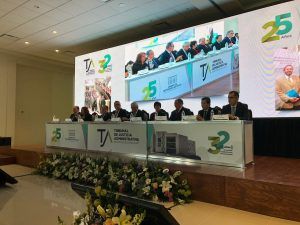Why Shared Narratives Matter More Than Ever
¿Por qué las narraciones compartidas importan más que nunca?
This article was first published by Apolitical. Click here to read the original article.
Arguably the most over-used word in public policy is “narrative”. Everyone likes to bandy it about, from politicians and pundits to scholars and therapists. So, do we really need an explanation as to why narrative is also important for public deliberation? The answer is, more than ever.
A new release from the Open Government Partnership’s Practice Group on Dialogue and Deliberation shows how building “shared narratives” can help governments reframe and solve difficult policy issues, from the tensions between climate change and economy to the reform of electoral systems.
Here’s a snapshot of what the Group has to say.
Why Narrative Really is Important for Public Deliberation
Storytelling is a basic human skill born of a basic social need. People hear a good story once and remember it for the rest of their lives. A good story invariably “travels” with them. Literary devices, such as metaphor, dialogue and dramatic tension all help us confront the unknown and make sense of the complexity of the human experience.
Take the metaphor of war. It has been widely used in the Covid-19 pandemic, and not just for the evocative imagery it tends to conjure. The war on Covid-19 has provided us with roles and a script for viewing and responding to the crisis. We treat the virus as an “invisible enemy”. We answer the “call to duty”. The word alone gives order and meaning to a complex set of facts, values and priorities.
A shared narrative helps establish common ground on which participants in these processes can make progress on an issue.
Of course, in war governments assume new powers. And as we’ve seen, new conflicts can erupt between those who think, for example, that in the current emergency the state has the right to order citizens to socially distance and wear face masks and those who disagree. This is where compelling narratives can divide as well as unite people.
The Practice Group’s paper sees narrative building as an emerging opportunity for public deliberation (we’ve discussed the Group’s views on deliberation previously on Apolitical.) A shared narrative helps establish common ground on which participants in these processes can make progress on an issue.
What is Narrative Building?
Public deliberation processes call on participants to deal with issues objectively. They engage in careful reasoning that is supported by data and information and informed by knowledge and expertise. Conflicting values or interests are often a barrier, however, and can’t be resolved by evidence alone the way disputes over facts can.
One great example of this is the issue of climate change. Objectively, we know that to alleviate the problem, we must reduce greenhouse gas emissions. However, if many countries remain heavily dependent on coal, oil, and/or natural gas, a rapid reduction could throw their economies into a tailspin. Decision-makers thus struggle with how to “balance” concerns over the environment with concerns over economic stability and people’s livelihoods.
Finding that balance requires reliable data on the impact of new policies on weather patterns and the economy. Unfortunately, the facts and data available often aren’t clear or complete enough to define where exactly the balance lies. What is required therefore is judgement, which is where values-based narratives come into play.
In general, the public’s views on policy are usually grounded in a background story or narrative
Someone who puts a high value on jobs may be more willing to live with the risk of melting glaciers than someone who cares passionately about the loss of the world’s coral reefs. The first person may support a staged transition to renewable energyEnsuring universal access to sustainable, dependable, and affordable energy is critical to every aspect of prosperity. Increasing public oversight and transparency in the energy sector can help to ens... More, while the second may want an immediate end to the use of hydrocarbons. Both may be drawing on the same studies and facts to arrive at completely different value judgements.
At face value, public deliberation provides little in the way of tools to resolve such tensions. Participants who disagree profoundly on values are often simply asked to sit down together, put aside their subjective interests and try to find a reasonable and fair accommodation. This is not only difficult but can widen already hostile divisions. Injunctions to merely “respect one another” do little to reconcile people’s deeply-held convictions.
The Practice Group’s paper argues that the gulf in values between citizens and the solution to bringing them closer together both involve narrative building. In general, the public’s views on policy are usually grounded in a background story or narrative. Typically, these are created by opposed groups of advocates who frame a narrative to support a specific interest or set of values and objectives that they want to promote and achieve.
Narrative building helps a diverse group of stakeholders recognise and understand the role that values play in their dispute and highlights the other objectives and values they share
A shared narrative, by contrast, is a story that opponents create together, from the bottom up, through a deliberative process. This requires a conscious effort to stand back and see the bigger picture.
The participants start by listening to each other’s stories. This not only builds trust, it clarifies how the subjective aspects of their experience — their values, interests and emotions — are intertwined with their positions.
Learning about these different experiences uncovers shared understanding and points of overlap between competing narratives. Thus, it builds bridges. Special techniques are used to align the stories around these points of contact in ways that everyone can accept.
While a shared narrative is not yet a solution to the policy issues (that comes later) it creates the common ground participants need to begin discussing how to mitigate risks or balance competing values in ways that are more likely to achieve respect and fairness.
Findings from the Study
The Practice Group’s paper uses three case studies to illustrate key techniques and challenges in building a shared narrative and summarizes the findings in five key points:
- Shared narratives are built from the bottom up
- Narrative building requires deliberation
- Truth, fairness, and respect are guiding principles of narrative building
- Deliberation takes both an internal and an external form
- While a shared narrative creates common ground, it does not solve all the problems
So, narrative building helps a diverse group of stakeholders recognise and understand the role that values play in their dispute and highlights the other objectives and values they share. The process is about informed compromise, respect and the successful accommodation of difference. It is a new way for public servants to put this ancient skill to work on the issues of our day. — Damian Carmichael and Don Lenihan
The Practice Group includes government and civil society members from around the globe who share a deep interest in public deliberation. The Group was formed to promote the use of deliberation among OGP members. The narrative-building paper is Volume IV in The Deliberation Series and can be downloaded here.
Featured Image Credit: Unsplash
Este artículo fue escrito por Don Lenihan y Damian Carmichael, copresidentes del Grupo Temático de Diálogo y Deliberación de la OGP. Traducción de Ernesto Velasco. El artículo fue publicado por primera vez por Apolitical. Lee el artículo original en inglés aquí.
Una de las palabras que más abusadas en el campo de las políticas públicas posiblemente es “narración”. A todo el mundo le gusta hablar de ella, desde políticos y expertos hasta eruditos y terapeutas. ¿Es realmente necesario explicar por qué las narraciones son importantes para la deliberación pública? Nuestra respuesta es que sí, ahora más que nunca.
Un nuevo documento del Grupo Temático de Diálogo y Deliberación de la Alianza de Gobierno Abierto explica cómo la construcción de “narraciones compartidas” puede ayudar a los gobiernos a encuadrar y resolver asuntos de política difíciles como, por ejemplo, las tensiones entre el cambio climático y el crecimiento económico, o la reforma de sistemas electorales.
A continuación, se presentan las ideas centrales del Grupo contenidas en dicho documento.
¿Por qué la narrativa es realmente importante para la deliberación pública?
Contar historias es una habilidad humana nacida de una necesidad social básica. Si las personas escuchan una buena historia, la recordarán por el resto de sus vidas. Es decir, invariablemente “viaja” con ellos. Los dispositivos literarios, como la metáfora, los diálogos y la tensión dramática nos ayudan a confrontar lo desconocido y a dar sentido a la complejidad de la experiencia humana.
Un ejemplo es la metáfora de la guerra. Durante la pandemia de Covid-19 dicha metáfora se ha usado con frecuencia, no sólo por las imágenes que suele evocar. La guerra contra la enfermedad asigna papeles a desempeñar y un guion para entender y actuar frente a la crisis: el virus es tratado como un “enemigo invisible” y respondemos al “llamado del deber”. La idea por sí sola ordena y dota de significado a un conjunto ambiguo de hechos, valores y prioridades.
Una narración compartida ayuda a establecer un espacio común en el que los participantes en estos procesos pueden acordar y avanzar respecto de un tema.
Por supuesto, en la guerra los gobiernos asumen nuevos poderes. Como resultado, aparecen nuevos conflictos entre aquellos que piensan, por ejemplo, que en la emergencia actual el estado tiene atribuciones para ordenar mantener distancia social y usar máscaras faciales y aquellos que no están de acuerdo. De esta forma, las narraciones atractivas pueden dividir o unir a las personas.
El documento del Grupo de Temático considera que la creación de narraciones es una oportunidad crecientemente reconocida para apoyar la deliberación pública (hemos discutido las opiniones del Grupo sobre la deliberación anteriormente en Apotical.) Una narración compartida ayuda a establecer un espacio común en el que los participantes en estos procesos pueden acordar y avanzar respecto de un tema.
¿Qué es la construcción de narraciones?
Un proceso de deliberación pública requiere que las y los participantes examinen los asuntos de manera objetiva, que se involucren en un razonamiento cuidadoso respaldado por información y evidencia, informado tanto por el conocimiento y como por la experiencia. Sin embargo, los valores o intereses contradictorios son a menudo una barrera que no puede evitarse recurriendo únicamente a los datos.
Un buen ejemplo de esto es el cambio climático. Objetivamente, sabemos que, para aliviar el problema, debemos reducir las emisiones de gases de efecto invernadero. Sin embargo, si muchos países siguen dependiendo del carbón, el petróleo y/o el gas natural, una rápida reducción podría causar una espiral descendente devastadora para sus economías. Es por esta razón que los tomadores de decisiones deben buscar cómo “equilibrar” las preocupaciones sobre el medio ambiente con las aquellas sobre la estabilidad económica y los medios de vida de las personas.
Encontrar ese equilibrio requiere datos fiables sobre el impacto de las nuevas políticas en los patrones climáticos y la economía. Desafortunadamente, los hechos y los datos disponibles a menudo no son lo suficientemente claros o completos como identificar dónde se encuentra exactamente ese equilibrio. Por lo tanto, lo que se requiere es el juicio, que es donde entran en juego las narrativas basadas en valores.
En general, las opiniones del público sobre la política suelen basase en una historia de fondo o narración
Alguien que valora altamente el nivel de empleo está dispuesto a aceptar un riesgo mayor de que se derritan los glaciares en comparación con alguien que es apasionado de la protección de los arrecifes de coral alrededor del mundo. La primera persona puede apoyar una transición escalonada a las energías renovables, mientras que la segunda puede querer un alto inmediato al uso de hidrocarburos. Ambos pueden estar recurriendo a los mismos estudios y hechos para llegar a juicios de valor completamente diferentes.
En principio, la deliberación pública proporciona pocas herramientas para resolver tales tensiones. Cuando los participantes discrepan profundamente respecto de los valores, frecuentemente se les pide que se sienten juntos, dejen de lado sus intereses subjetivos y traten de encontrar un acuerdo razonable y justo. Esto no sólo es difícil, sino que puede profundizar aún más las diferencias. Los llamados a simplemente “respetarse unos a otros” hacen poco por reconciliar las convicciones profundamente arraigadas de las personas.
El documento del Grupo sostiene que, tanto la existencia de brechas irremontables entre los valores de los ciudadanos, como la vía para acercar posturas implican un ejercicio de construcción de narraciones. En general, las opiniones del público sobre la política suelen basase en una historia de fondo o una narración. Típicamente, estas son creadas por grupos opuestos para presentar un marco que apoye un interés específico o un conjunto de valores y objetivos que quieren promover y lograr.
La construcción narrativa ayuda a un grupo diverso de actores involucrados a reconocer y comprender el papel que juegan los valores en su disputa y destaca los otros objetivos y convicciones que comparten
Una narración compartida, por el contrario, es una historia que los oponentes crean en conjunto, de abajo hacia arriba, a través de un proceso deliberativo. Esto requiere un esfuerzo consciente para dar un paso atrás y ver el panorama general.
Los participantes comienzan escuchando las historias de los demás. Esto no sólo genera confianza, sino que aclara cómo los aspectos subjetivos de su experiencia —sus valores, intereses y emociones— se entrelazan con sus posiciones.
El aprendizaje derivado de este ejercicio de escucha permite una comprensión compartida e identificar aquellos puntos donde hay coincidencias entre las distintas narraciones. Por lo tanto, construye puentes. Se utilizan técnicas especiales para alinear las historias en torno a estos puntos de contacto de manera que sea aceptable para todas y todos.
Si bien una narrativa compartida aún no es una solución a los diferendos políticos (que ocurre más adelante), sí crea un espacio para que los participantes puedan discutir los riesgos y lograr balancear los valores en competencia, con vistas a lograr respeto y equidad.
Resultados del estudio
El documento del Grupo utiliza tres estudios de casos para ilustrar técnicas y desafíos clave en la construcción de una narración compartida y destaca cinco puntos clave:
- Las narraciones compartidas se construyen de abajo hacia arriba;
- El edificio narrativo requiere deliberación;
- La verdad, la justicia y el respeto son principios rectores de la construcción narrativa;
- La deliberación adopta tanto una forma interna y como externa; y
- Si bien una narrativa compartida crea un terreno común, no resuelve todos los problemas.
Por lo tanto, la construcción narrativa ayuda a un grupo diverso de partes interesadas a reconocer y comprender el papel que los valores desempeñan en su disputa y destaca los otros objetivos y valores que comparten. El proceso se trata de lograr un acuerdo informado, el respeto entre las partes y la incorporación exitosa de las diferencias. Es una nueva forma para que los servidores públicos pongan esta antigua habilidad a trabajar en los asuntos que importan en nuestros días.
El Grupo de Práctica está integrado por servidores públicos y pertenecientes a la sociedad civil de todo el mundo que comparten un profundo interés por la deliberación pública. El Grupo existe para promover el uso de la deliberación entre los miembros de la OGP. El documento de construcción de narraciones es el Volumen IV de la Serie sobre Deliberación y se puede descargar el documento aquí.
Crédito de la foto destacada: Unsplash
No comments yet
Related Content

Volume IV: The Role of Narrative Building in Public Deliberation
This paper argues that problems and solutions in public deliberation typically involve narrative building.

OGP Practice Group on Dialogue and Deliberation
OGP's Practice Group on Dialogue and Deliberation was created to foster and support the use of deliberative practices within the OGP and by its members.

Partnerships and Coalitions
OGP convenes and participates in different coalitions and thematic groups to advance a range of issues including beneficial ownership transparency, water, and gender. OGP has also signed agreements with key…


Leave a Reply